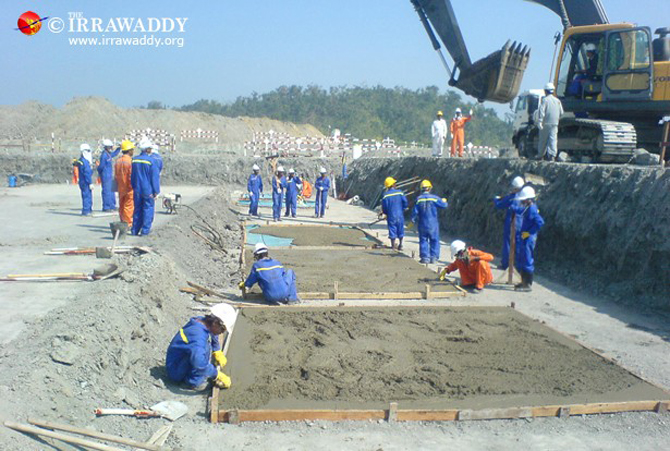Arakan Suffering for China's Pipeline

“We can't go to school on rainy days as the road condition is not good,” said Aung Aung, a sixth grade student, while walking carefully to avoid the many muddy ponds along the street.
Holding sandals in hand as they are useless on the squelching surface, Aung Aung and his classmates trundle home wearing faded school uniforms and bags across their shoulders. The school-friends live in New Leikkamaw and have to walk for more than an hour down this sodden stretch to reach their school in Gonchain, near Kyaukpru Township, in Arakan State.
Even though the road has never been sealed with tar it was still even and so considered of good quality for the area. People from nearby villages could use it all year, and around 400 middle and high school students from New and Old Leikkamaw, Malakyun and Pyinshay villages would walk back and forth to lessons everyday.
The road condition, however, has deteriorated ever since a deep seaport project began on Maday Island in Kyaukpru. The smooth surface became churned up by trucks taking building materials to the construction site.
“Every day trucks weighing 20-30 tonnes use this road, and it has been destroyed as it can only handle around five tonnes. As a result, children can't go to school when heavy rain falls,” a villager from Gonchain explained.
He added that the local authorities and company officials have been informed about its dire condition, but no one has yet taken any action.
But it is not just the education of children that has suffered. A farmer from Kyaukpru's Ohndaw Village told The Irrawaddy that farmlands adjacent to the project site became like ponds as more earth gets piled onto them, blocking the flow of water into paddy fields.
Around 30 farmers and their families will find it difficult to support themselves next year as they cannot cultivate rice this season, he said.
Apart from the deep seaport, other construction works currently underway in Kyaukpru include oil and gas reservoirs, a gas refinery and pipelines.
These projects have been implemented by China National Petroleum Corporation, one of the biggest companies in China, other Chinese energy firms as well as South Korea's Daewoo and Hyundai, and domestic companies including Asia World, Myanmar Golden Crown and 7-Star and Petroleum Services Consultancy (PSC).
Meanwhile, Htoo Company owned by Tay Za, one of Burma's wealthiest businessmen, is reported to have been taking care of pipeline transportation. Companies from India, Malaysia, the Philippines and Korea are reportedly involved in the project to extend the pipelines.
A number of local people employed to perform menial work in these projects say that they have been exploited by Chinese supervisors and other Burmese coming from the cities.
“We had to sign for 8,000 kyat [US $10] wages per day but were actually given only 2,500 kyat [$3]. Around 100 employees have been dismissed from their jobs because they complained about it,” said a worker from Kyarkpru's Pikeseik Ward, who collects meagre daily wages helping to build a gas refinery near Gangawdaw Pagoda in town.
Those who were fired from one project are reportedly blacklisted from future employment and have their names on noticeboards at other work sites.
“I have applied for another job five times after being fired by the PSC but none of the companies have accepted me as I am on the blacklist,” said Maung Than.
He said that he was promised a salary of 120,000 kyat [$154] but received only 75,000 kyat [$96] at the end of the month. He therefore reported the matter to the local authorities, but was dismissed and threatened with jail by his boss, a man called Zaw Moe, if he complained again.
According to some employees, they had to spend 20,000 kyat [$26] just to fill out application forms and gain workers' identification cards. Some people say they are seeking legal help to submit their complaints to the International Labour Organization regarding the abuses.
And Kyaukpru residents told The Irrawaddy that many people in Maday and Malar Islands are facing disaster as their villages and farmlands, which they have worked on for generations, have been confiscated and destroyed with minimal compensation.
A villager from Kyauktan Village on Maday Island said that he had five acres of farmland and a garden but everything has been confiscated.
“I no longer have any farmland to cultivate rice. My garden was also confiscated for the project so I am now working as a brick carrier for survival. I am paid 2,000 kyat [$2.5] a day,” he explained.
Kyaukpru is located in the far north of Ramree Island at the base of the Bay of Bengal.
1 | 2 next page »
|
||
|
||
|
||
|
||
|
||
|
||
- 'My Wife Died From Police Abuse,' Says Husband
- US Says Observer Conditions Don't Meet Int'l Standards
- 159 Observers to Monitor Burma Election
- Govt to Address Breaches of SSA-South Ceasefire: Aung Min
- Burma Investors Pin Hopes on Seminal Sunday
- Malaysia PM Leads 50-Strong Delegation to Burma
- US Congress to Assess Burma's Political Prisoner Issue
- Rangoon Woman in Police Station Death Plunge
- Burmese Legal System Remains Tool of Govt: AHRC
- Burmese Army Chief Defends Political Role
